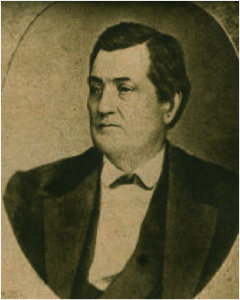Elisha Baxter facts for kids
Quick facts for kids
Elisha Baxter
|
|
|---|---|
 |
|
| 10th Governor of Arkansas | |
| In office January 6, 1873 – November 12, 1874 |
|
| Lieutenant | Volney V. Smith |
| Preceded by | Ozra Amander Hadley (acting) |
| Succeeded by | Augustus Hill Garland |
| Personal details | |
| Born | September 1, 1827 Rutherford County, North Carolina |
| Died | May 31, 1899 (aged 71) Batesville, Arkansas |
| Political party | Republican |
Elisha Baxter (born September 1, 1827, died May 31, 1899) was an important American politician and businessman. He served as the 10th governor of Arkansas from 1873 to 1874.
Contents
Early Life and Start in Politics
Elisha Baxter was born in Forest City, North Carolina. He wanted to attend the United States Military Academy (a famous school for training army officers). However, his father did not approve, so Baxter did not go.
He returned home and became a businessman. He ran a successful store in Rutherford County with his brother-in-law.
In 1852, Baxter moved to Batesville, Arkansas, and opened another store. This business did not succeed. Baxter then joined the Whig party. He was elected mayor of Batesville in 1853.
One year later, he was elected as a state representative for Independence County. He studied law and became a lawyer in Arkansas in 1856. He was reelected to the House of Representatives in 1858 and served until 1860.
Role During the Civil War
When the American Civil War began, Baxter did not want to fight for the Confederacy. He tried to escape to Missouri. He was captured and accused of treason.
He managed to escape north and joined the Union Army. He became a colonel in the 4th Arkansas Mounted Infantry (Union). In 1864, after Union troops took control of Arkansas, Baxter was made Chief Justice of the Arkansas Supreme Court.
Later, in May 1864, the new Arkansas legislature chose Baxter and William Meade Fishback to be U.S. senators from Arkansas. However, in February 1865, the U.S. Congress did not allow them to join. This was because some Republicans in Congress were unhappy with how easily President Lincoln was trying to bring Southern states back into the Union. In mid-1865, Baxter started a law firm in Little Rock with James M. Hinds, who also supported the Union.
Reconstruction Era and Governorship
In 1868, during the period known as Reconstruction, the state legislature again elected Baxter and Andrew Hunter to the U.S. Senate. But once more, Congress blocked their appointment. This was partly because Southern states were not yet giving voting rights to formerly enslaved people. From 1868 to 1872, Baxter served as a judge on the 3rd Circuit Court.
In 1872, Baxter was elected as the Republican Governor of Arkansas. This election was very controversial, and it led to a conflict known as the Brooks-Baxter War. His opponent, Joseph Brooks, and his supporters physically removed Baxter from the governor's office. Baxter was only able to return to his position about a month later.
During his time as governor, state delegates created a new constitution. This new constitution made the governor's term shorter. It also gave voting rights back to former Confederates. Baxter chose not to run for governor again in 1874.
After the 1890s, many Black citizens in Arkansas lost their right to vote. This caused the Republican Party to become much smaller in the state. The Democratic Party then controlled Arkansas politics for a long time, until the 1960s. Baxter was the last Republican governor elected in Arkansas until Winthrop Rockefeller in 1967.
Later Life and Legacy
After leaving office, Baxter went back to his farm near Batesville. He tried to get elected to the Arkansas House of Representatives again in 1878 but was not successful.
Elisha Baxter died in Batesville, Arkansas, and is buried at Oaklawn Cemetery there. Baxter County was named after him to honor his contributions.
Family Life
In 1849, Baxter married Harriet Patton. They had six children together: Milliard P., Edward A., Catherine M., George E., Hattie O., and Fannie E. Elisha Baxter was the brother of a federal judge named John Baxter. He was also the uncle of George W. Baxter, who became a territorial governor of Wyoming.
 | Janet Taylor Pickett |
 | Synthia Saint James |
 | Howardena Pindell |
 | Faith Ringgold |

